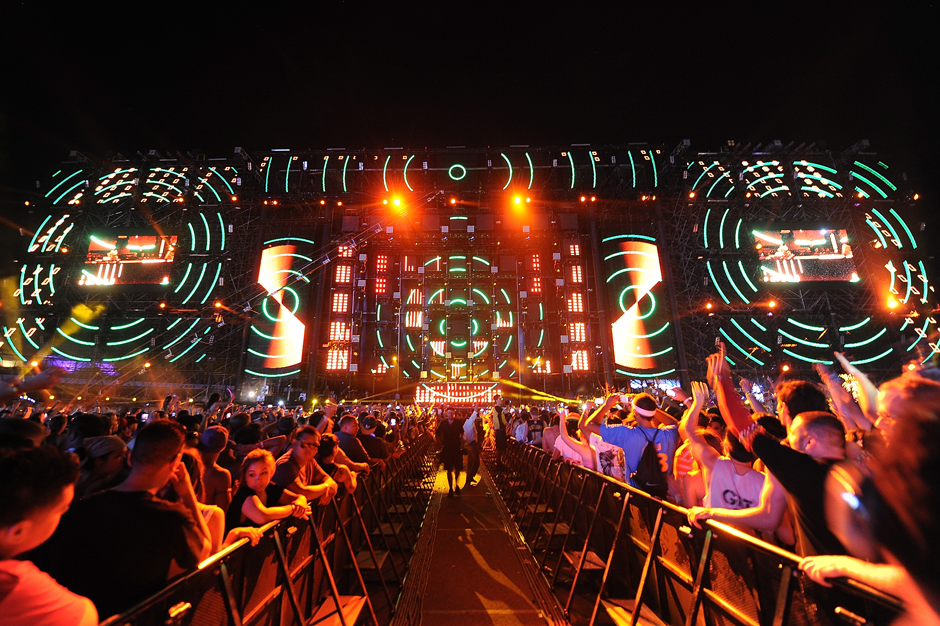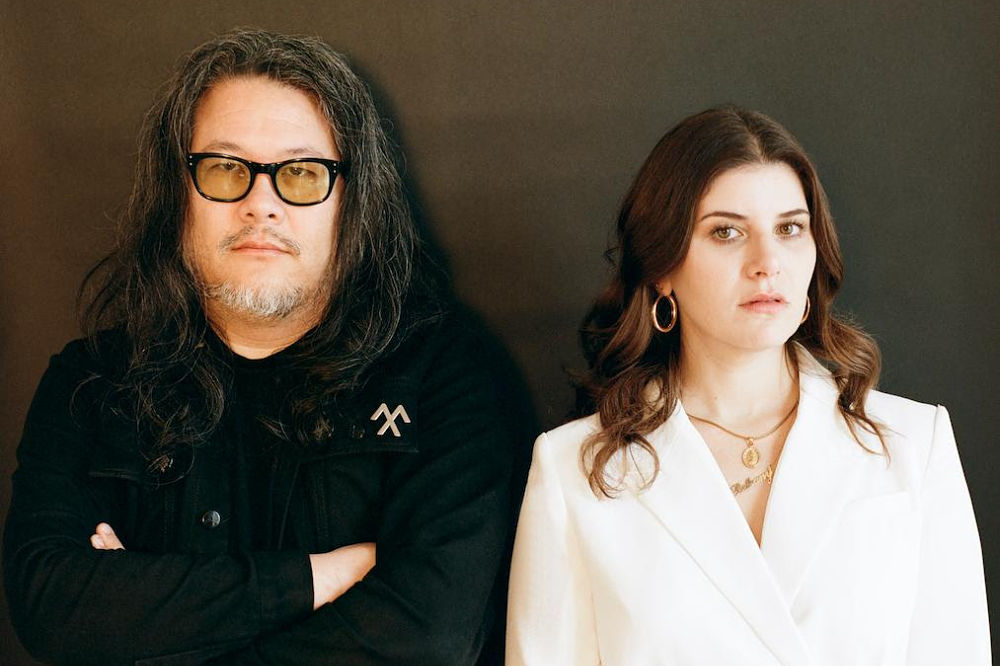For a while now, boosters have been touting Las Vegas as “the new Ibiza.” When I visited a year ago, I thought the comparison was something of a stretch; as I noted in my SPIN feature on Skrillex and the “New Rave Generation,” Ibiza’s club scene extends back to the 1980s and, for all its garish excess and monied interests, has grown somewhat organically. The Ibizan scene is tightly connected to a variety of communities — underground and commercial alike across Europe and the United Kingdom — which has helped to preserve stylistic variety on the island: It’s not all just big-room crossover fare, and you can encounter a variety of sounds and artists that you wouldn’t find on any of Vegas’ high-gloss lineups. Vegas’ club scene, like many things in the city, looks more like a simulacrum, a Disney-fied fantasy of clubbing that fits perfectly with the fake New York skyline and ersatz Eiffel Tower.
You can’t say that Sin City’s reality-spinners aren’t staying on message, though. I’ve read reports this year that there are billboards for Las Vegas nightclubs lining the airport road in Ibiza, interspersed with advertisements for local institutions like Amnesia and Pacha. Whether Vegas’ presence on the White Isle is a case of bringing coals to Newcastle or the sign of a tectonic shift in global nightlife remains to be seen. This weekend, Insomniac Events will make its case for the latter when it brings its flagship event, Electric Daisy Carnival, back to Vegas for the second year in a row, after getting booted out of Los Angeles in 2010. Last year’s EDC was a mammoth spectacle, with a total attendance of around 230,000 people across the three-day event. This year, they’re increasing their footprint with a week’s worth of pre- and after-parties in the city’s clubs; additionally, this week Insomniac sponsored EDMBiz, a professional conference hosted by ultra-insider and KCRW “tastemaker” DJ Jason Bentley, featuring panel discussions like “Brand Integration in EDM: The Hyundai Initiative” and “Circuit Breakers: Breaking EDM Artists.”
EDMBiz is clearly an attempt to replace Miami’s Winter Music Conference, a long-running professional confab for DJs, A&Rs, and aspirants, which has suffered a dramatic decline in attendance in recent years; it also arrives as a counterpart to Pete Tong’s International Music Summit (IMS), which just held its fifth annual installment in Ibiza. But a glimpse at the schedule suggests the extent to which the landscape has changed since the glory days of WMC. The Conference was a cattle-call of epic, and famously democratic, proportions, with eager DJs descending upon Miami with hopes of getting signed, white labels (and later, CD-Rs) in hand. Many succeeded; in my interview with Dirtybird’s Justin Martin last month, he told me how a demo CD handed out at WMC got him signed to Ben Watt’s Buzzin’ Fly.
But the EDMBiz agenda privileges a top-down model, with a list of speakers tilted heavily toward the major labels and massive talent agencies; keynote speakers include Atlantic Records CEO Craig Kallman and Live Nation CEO Michael Rapino. To be fair, some independent players are represented, like the Windish Agency and Detroit’s Paxahau. But, by and large, the conference’s agenda reinforces what the New York Times‘ Ben Sisario described just this week as “a wave of corporate interest in dance music,” including a major new salvo from Robert F.X. Sillerman, the founder of Live Nation, who plans to invest $1 billion this year, snapping up electronic-music promoters and merging them into an iron-clad conglomerate.
For evidence of corporate EDM’s fling with the big bucks, look no further than Michael Satsky, a representative of Provocateur nightclub in New York’s Hotel Gansevoort. Speaking on the “Circuit Breakers: Breaking EDM Artists” panel, he described his success in tapping into “a niche for electronica within high-net-worth individuals,” as August Brown reported in the Los Angeles Times. Once alternately celebrated for its futurism and derided as derivative, electronic dance music is now viewed more like futures and derivatives.
But the love-in between the EDM community and Las Vegas — not to mention those high-net-worth individuals — is already being tested. At the Cosmopolitan hotel’s Marquee last weekend, the veteran Chicago house DJ Mark Farina, who was to follow Miguel Migs and Julius Papp, says that he was asked not to play after the day-club’s manager received “complaints from their table-service crowd.” A Marquee rep told Las Vegas CityLife, vaguely: “It was the end of the afternoon and management made a decision to reschedule him for another day.” But, as CityLife‘s Mike Prevatt reports, “Farina was replaced by another DJ who began playing more commercial house.”
The incident echoes a recent kerfluffle at Miami’s Mansion nightclub, where the New York house DJ Dennis Ferrer claims he was kicked off the decks “for not playing commercial enough.”
As Spinal Tap‘s lovably cutthroat Bobbi Flekman once explained, “Money talks, and bullshit walks.” But if the big money’s not careful, it could witness an exodus of the dance-music faithful from the playground being constructed for them with all the haste of a Nevada high-rise. Not that the major labels and mega-agencies don’t have a place in the equation, but electronic dance music always has been, fundamentally, a culture of independent labels and intractable fans, and that’s not likely to change any time soon. We may be headed for a split in the scene, as the big investors create a gated community designed to their own specifications, and the strong-willed masses make their own rave in the vacant lot adjacent.
None of this need concern actual fans; corporate rock didn’t kill off the underground, even when the suits co-opted “alternative rock”; indeed, it could be a good kick in the pants for grassroots electronic music scenes, in the same way that a cash-bloated ’70s rock scene helped instigate and sustain punk’s rebellious fury. Vegas certainly needn’t worry: High-net-worth individuals, and those willing to fork over the cover charge to party with them, aren’t going away any time soon, no matter the soundtrack (or the recession).





